Product Description
 Professional care providers can learn ways to avoid one of the most difficult and often tragic problems to occur in care settings: When residents with memory loss act in ways that harm another resident. Many of these episodes are preventable. Understanding what may provoke a person with dementia to respond in a physically or verbally harmful manner is the key to prevention and mitigation. This book provides the first care standard for the field, presenting practical tools and instruction on how to identify contributing factors, causes, unmet needs, and triggers that commonly lead to serious distress or injury, sometimes even death.
Professional care providers can learn ways to avoid one of the most difficult and often tragic problems to occur in care settings: When residents with memory loss act in ways that harm another resident. Many of these episodes are preventable. Understanding what may provoke a person with dementia to respond in a physically or verbally harmful manner is the key to prevention and mitigation. This book provides the first care standard for the field, presenting practical tools and instruction on how to identify contributing factors, causes, unmet needs, and triggers that commonly lead to serious distress or injury, sometimes even death.
Emphasizing compassionate, person-directed care practices, author Eilon Caspi describes numerous psychosocial strategies to use to prevent and de-escalate situations prior to, during, and after harmful resident-to-resident interactions. Included are dozens of real-life examples illustrating what does and does not work in addressing these episodes.
Based on extensive research and proven behavioral analysis, this valuable resource:
- Identifies 88 factors—personal triggers, interpersonal dynamics, the physical environment—that contribute to harmful interactions
- Describes which factors can be modified and which cannot, and how to work with them either way
- Creates opportunities for significant improvement in resident and staff well-being
- Delivers useful screening and intervention tools
- Provides access to downloadable assessment tools and detailed instructions on how to use them
This critical resource will inform training programs and daily practice for direct care staff, interdisciplinary teams, and long-term care administrators. The recommended approaches will help providers meet federal nursing home regulations, avoid unnecessary legal liabilities, and enjoy cost savings from reduced resident-to-resident incidents. A safer and more harmonious experience can be achieved for all who live or work in care homes.
Available for download with purchase of book!
Processes and Tools for Prevention of Distressing and Harmful Resident-to-Resident Interactions
Introduction: Conceptual Framework and Process for Assessment and Prevention of DHRRIs
Phase 1
- Process: Documenting and Assessing Behavioral Expressions
- Tool: Behavioral Expressions Log
Phase 2
- Process: Evaluation of Urgency of DHRRIs
- Tool: Evaluation of Urgency Form
Phase 3
- Process: Interdisciplinary Screening
- Tool: Interdisciplinary Screening Form
Phase 4
- Process: Behavioral Expressions Prevention Planning
- Tool: Behavioral Expressions Prevention Plan Form

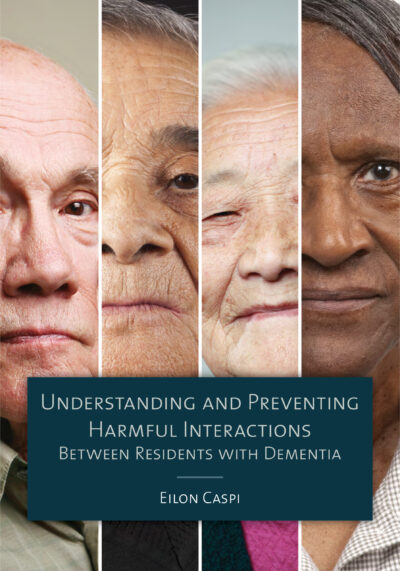
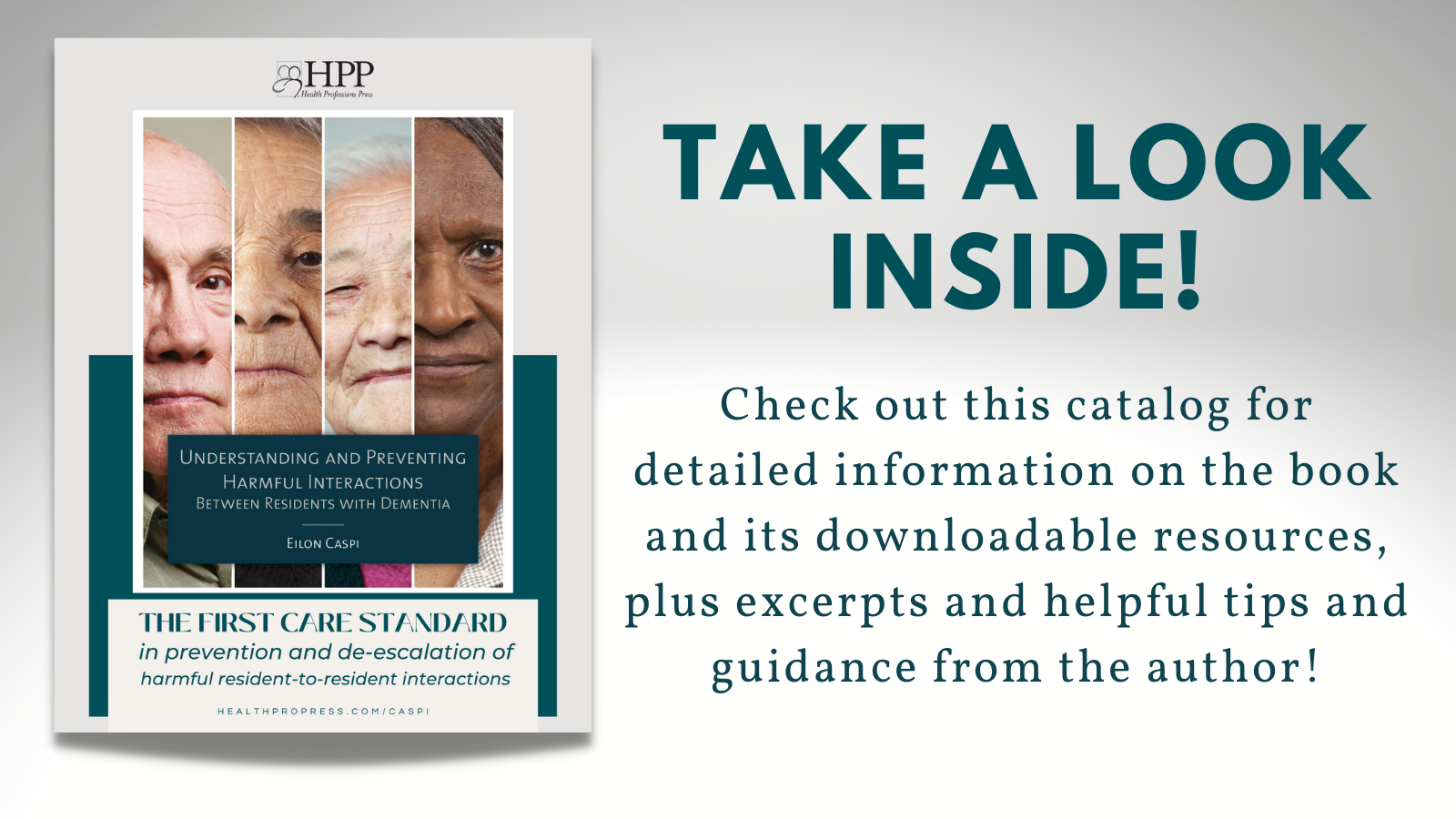
 Eilon Caspi, Ph.D., is a gerontologist and dementia behavior specialist. He is the founder and director of
Eilon Caspi, Ph.D., is a gerontologist and dementia behavior specialist. He is the founder and director of 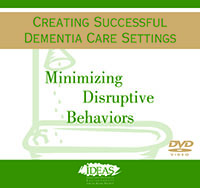
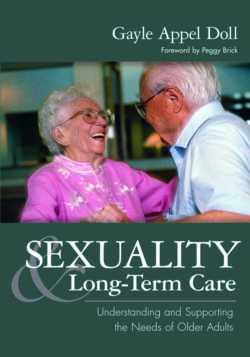
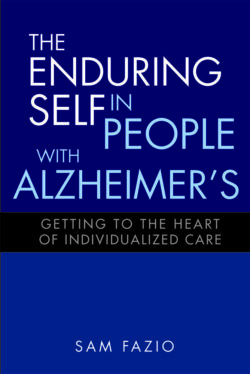
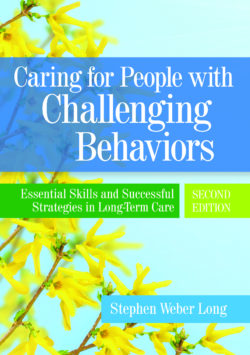
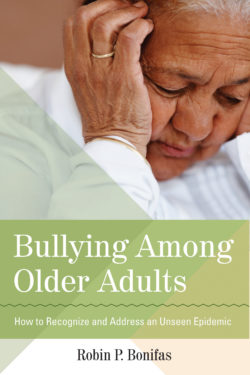
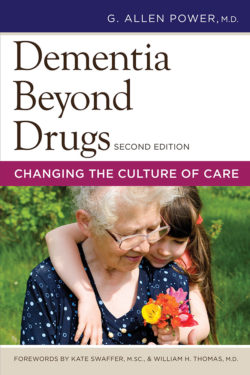
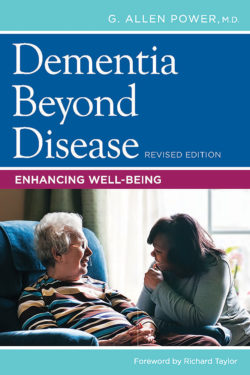
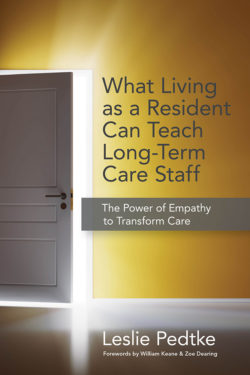
Christa Hojlo –
“A goldmine of evidence-based interventions…. The best thing I have seen out there that folks can pick up and apply.”
–Dr. Christa M. Hojlo, former National Director of VA Community Living Centers
Francis Caro –
“An essential resource for understanding and preventing resident-to-resident aggression wherever seniors with dementia live together. Caspi draws skillfully on the literature and his own research to provide care providers with practical advice to keep residents with dementia safe and free from psychological harm.”
—Francis G. Caro, PhD, Professor Emeritus of Gerontology, University of Massachusetts Boston
Al Power –
“Eilon Caspi serves up an important challenge to the notion that dementia simply causes people to become ‘aggressive.’ In doing so, he provides an excellent framework for understanding the myriad factors that can erode one’s well-being, and the ways in which they can be successfully alleviated.”
—G. Allen Power, M.D., Geriatrician, Schlegel Chair in Aging and Dementia Innovation, Schlegel-UW Research Institute for Aging, author of Dementia Beyond Drugs and Dementia Beyond Disease
Mary Schulz –
“Dr. Caspi brings compassion and clarity to the critical issue of harmful interactions between residents with dementia living in long term care homes. His evidence-informed strategies provide practical value for families and care providers who struggle to address and prevent these deeply concerning events.”
—Mary Schulz, MSW, RSW, Former Director of Education, Alzheimer’s Society of Canada
Lori La Bey –
“Eilon Caspi’s thought-provoking book gives us a different lens to look through, allowing us to see things in a new light. His insights and tools to prevent harmful interactions between residents can support us as we shift dementia care from crisis to comfort.”
—Lori La Bey, Founder of Alzheimer’s Speaks, and Cofounder of Dementia Map Global Resource Directory
Robin Bonifas –
“Dr. Caspi’s book Understanding and Preventing Harmful Interactions Between Residents with Dementia is a much-needed resource to guide person-centered intervention to address behavioral challenges that arise between individuals in the context of dementia. Senior care providers across a range of settings will find the information highly useful in understanding what contributes to problematic interactions and in determining what to do about them. I am particularly impressed with the level of sensitivity and thoughtful care Dr. Caspi expresses toward persons with dementia; his strength-based, compassionate explanations of the dementia experience provide important advocacy for this population and can promote greater empathy in the behavioral assessment and intervention process.”
—Robin P. Bonifas, PhD, MSW, LICSW, Chair and Professor, Department of Social Work, College of Health and Human Services, Indiana State University, and author of Bullying Among Older Adults: How to Recognize and Address an Unseen Epidemic
Nina M. Silverstein –
“Caspi illuminates a well-known but, until now, a largely ignored phenomenon of distressing and harmful resident-to-resident interactions (DHRRI) among persons with dementia in long-term care homes. Contributing to keeping this phenomenon invisible is that the CMS database has yet to implement a GAO recommendation that such incidents be tracked and submitted by state survey agencies. At the heart of Caspi’s book is the message of person-directed practice. He cautions us that words are powerful and capable of perpetuating harmful beliefs about persons with dementia that will cause some direct care providers to accept negative interactions rather than try to de-escalate through listening, drawing on pearls from the past, and building trust. His 12 principles for approaching DHRRIs provides a framework for direct care providers to better understand the triggers of DHRRI and strategies to prevent or de-escalate harmful interactions. Add this book to your toolkit and appreciate that in better management of negative interactions, positive interactions of human expression will emerge.”
—Nina M. Silverstein, Ph.D., Professor of Gerontology, University of Massachusetts Boston
Éthelle G. Lord –
“In this book by Dr. Eilon Caspi, the author gets to the heart of the problem concerning aggressive behaviors among people with dementia. He offers a series of evidence-based solutions and stresses the importance of recognizing basic feelings of sadness, gladness, madness, and fearfulness every person is born with being honored and respected. Dr. Caspi’s research into preventing harmful resident-to-resident interactions, sometimes leading to injury and death, is an important one; often minimized and even overlooked.
Training and experienced in dementia care myself for over two decades, I highly recommend this book to care homes and nurse training programs. The reality is that without proper knowledge, understanding, compassion, and empathy for this condition, more and more incidents leading to serious injuries, or death, will continue to occur.”
—Éthelle G. Lord, DM, International Caregivers Association, LLC, President, ICA, and GSHA Practitioner. Author of Alzheimer’s and Dementia Coaching
Gloria M. Gutman –
“In this book, maintaining personhood and privacy are key themes used to explain acting out behavior on the part of one or both harmed residents when altercations occur between residents with dementia in nursing home settings. Rather than normalizing these altercations, he presents 12 steps to preventing them—a must read for nursing home administrators, front line staff, and caring families.”
—Gloria M. Gutman, CM, OBC, PhD, LLD (Hon.), FCAHS, FGSA, Professor/Director Emerita, Dept. of Gerontology/Gerontology Research Centre, Simon Fraser University Vancouver Canada, and Immediate Past-President, International Network for the Prevention of Elder Abuse (INPEA)
Geert Bettinger –
“Caspi insightfully and thoroughly addresses a phenomenon that has long been rife with misconceptions and stigma; one that often provokes aversion. He uses the power of language to increase understanding of behaviors our society normally rejects. Instead of ‘aggression’ he uses ‘interaction,’ which allows us to see these human expressions as precious signals rather than problems to control. By doing so, he opens up new opportunities to affirm the dignity of individuals living with dementia, understand their emotional and other needs, and keep them safe.”
—Geert Bettinger, author of Moving on By Standing Still: A Different View of “Problem Behavior”
Kristine Sundberg –
“Ignorance is not bliss in the world of long-term care. Members of Elder Voice Family Advocates have learned this painful lesson the hard way. Thankfully, Dr. Caspi is exposing an often-unrecognized issue that can have very serious consequences. This is a must-read for families, long-term care providers, and elder care advocates to better understand the underlying reasons for resident-to-resident problems and the solution to better manage this behavior.”
—Kristine Sundberg, Executive Director, Elder Voice Family Advocates
Jean Hourigan Peters –
“Dr. Caspi has turned his expertise in the area of elders with dementia and resident-to-resident abuse into a very readable, evidence-based guide for families, caregivers, and owners of long-term care homes.”
—Jean Hourigan Peters, RN, CNP, President, Elder Voice Family Advocates
Theresa Piccolo –
“This book exposes the hidden public health problems of resident-to-resident aggression in long-term care homes. Had I access to this information 14 years ago, my husband might still be alive. The book should be required reading for those in the healthcare industry who are determined to end this prevalent and harmful form of elder neglect in nursing homes and assisted living residences.”
—Theresa Piccolo, wife of 68-year-old Frank Piccolo, who lived with dementia and was severely injured by another resident who entered his bedroom. His condition deteriorated after the attack, and he died three months later.
Richard Mollot –
“This is an important book for anyone concerned about quality of life, safety, and dignity for individuals living with dementia. Dr. Caspi’s knowledge, empathy, and wisdom come through in every chapter.”
—Richard J. Mollot, Executive Director, The Long Term Care Community Coalition
Vicki de Klerk –
“Eilon Caspi knows how to step into the world of disoriented very old people and see things through their eyes. With empathy, he advocates for them, protects them, speaks out for them. This book addresses the important subject of ‘aggression’ in older adults living with cognitive decline. He shows us the reasons behind the behavior and reframes their expression of anger so that we, the caregivers, can better connect, communicate, and help them find other ways of expressing strong emotions.”
—Vicki de Klerk, Executive Director of the Validation Training Institute, daughter of Naomi Feil, the founder of the Validation method and Validation Master Teacher
Jim Vanden Bosch –
“In working with Eilon to edit the video he co-produced on injurious and fatal resident to resident incidents in long term care homes (Fighting for Dignity), I quickly came to appreciate his deep commitment to honoring the personhood of individuals living with dementia. This commitment and sensitivity, matched with his years of extensive research, bring a special kind of authenticity to this book.”
—Jim Vanden Bosch, Executive Director, Terra Nova Films
Deborah Pentecost –
Interested in purchasing the book but must be able to “Look Inside” prior to ordering.
Administrator –
Hi Deborah, Thank you for your interest in this book! When the book publishes in October, an excerpt will be available on this page under the “Look Inside” tab.
HPP Admin –
“Exceptionally well written, organized and presented, Understanding and Preventing Harmful Interactions Between Residents with Dementia is an ideal and seminal instruction manual and guide that will be of immense value to anyone having to care for patients and residents of sheltered care facilities for those suffering from Alzheimer’s and other forms of dementia. Also available for personal reading lists in a digital book format, [this book] is an essential and core addition to professional, sheltered care facilities, college, and university library Long Term Nursing, Geriatrics, and Gerontology collections and supplemental studies curriculum syllabus.”
–Midwest Book Review
HPP Admin –
“This is an outstanding resource to use as an educational tool for frontline caregivers and those working with dementia residents especially if they have behaviors that may impact other residents with or without dementia. This book is a vital informational and educational tool…a resource that will benefit any caregiver in any setting that cares for residents living with dementia. It is especially beneficial for those caregivers working on dementia units within nursing homes or other facilities.”
–Doody’s Review